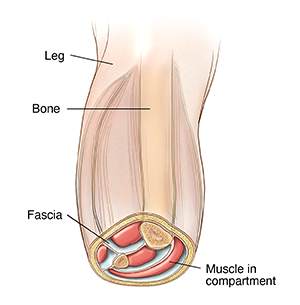Understanding Compartment Syndrome
A compartment is a group of muscles, blood vessels, and nerves. This group is enclosed by strong tissue called fascia.
An injury or other problem may cause tissue inside the compartment to swell. Or blood or other fluid may build up. Either can lead to too much pressure inside the compartment. The pressure can quickly damage muscle and other tissues. The condition is an emergency that should be treated right away.
Compartment syndrome most often affects the legs, arms, feet, hands, and buttocks.

Causes of compartment syndrome
The most common cause is an injury. It's often a major injury, such as a broken bone, crush injury, or severe burn. But more minor injuries can also lead to it. A bandage, splint, or cast put on too tightly can also cause it. In rare cases, causes include animal bites, bleeding disorders, or injecting illegal drugs.
Symptoms of compartment syndrome
These include:
-
Pain that gets worse quickly
-
Pain beyond what is expected for the type of injury
-
Burning or aching felt deep in the muscle
-
Loss of feeling or numbness
Treatment for compartment syndrome
Compartment syndrome must be treated as soon as possible. Treatment may include:
-
Removing a cast, splint, or bandage. This can reduce pressure.
-
Keeping your affected arm or leg level with your heart. This helps reduce pressure.
-
Taking prescription or over-the-counter medicines. These can relieve pain and swelling.
-
Getting extra oxygen. This can help limit tissue damage.
-
Managing blood pressure. This prevents low blood pressure and helps the area get enough circulation.
-
Having surgery to open up the fascia. This helps relieve the pressure and prevent further tissue damage.
Possible complications
If compartment syndrome isn’t treated quickly, muscles and nerves can die. Dead muscle can’t be repaired and must be removed. In some cases, you may need surgery to remove the affected body part (amputation).
When to call your healthcare provider
Call your healthcare provider right away if you have any of these:
-
Severe pain or pain that quickly gets worse. This may be hours after the injury.
-
Pain that doesn't get better after taking pain medicines
-
Numbness or tingling
-
Weakness
-
Problems moving affected muscles
-
New symptoms